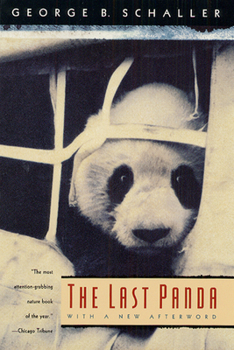The Last Panda
Select Format
Select Condition 
Book Overview
Dependent on a shrinking supply of bamboo, hunted mercilessly for its pelt, and hostage to profiteering schemes once in captivity, the panda is on the brink of extinction. Here, acclaimed naturalist George Schaller uses his great evocative powers, and the insight gained by four and a half years in the forests of the Wolong and Tangjiahe panda reserves, to document the plight of these mysterious creatures and to awaken the human compassion urgently needed to save them. "No scientist is better at letting the rest of us in on just how the natural world works; no poet sees the world with greater clarity or writes about it with more grace. . . . Anyone who genuinely cares for wildlife cannot help being grateful to Schaller--both for his efforts to understand the panda and for the candor with which he reports what has gone so badly wrong in the struggle to save it from extinction."--Geoffrey C. Ward, New York Times Book Review "Schaller's book is a unique mix of natural history and the politics of conservation, and it makes for compelling reading. . . . Having been in giant panda country myself, I found some of the descriptions of the animals and habitats breathtaking. Schaller describes the daily routines and personalities of the giant pandas he studied (as well as their fates thereafter) as though they were his blood relatives. . . . Schaller's brilliant presentation of the complexities of conservation makes his book a milestone for the conservation movement."--Devra G. Kleiman, Washington Post Book World "George Schaller's most soulful work, written in journal style with many asides about a creature who evolved only two to three million years ago (about the same time as humans). . . . Here, conservation biology confronts an evil that grinds against hope and shatters the planet's diversity. Written with hope."--Whole Earth Catalog "A nicely crafted blend of wildlife observation and political-cultural analysis. . . . The Last Panda is a sad chronicle of our failure, so far, to stem the decline of the animal that may be the most beloved on the planet."--Donald Dale Jackson, Smithsonian
Format:Hardcover
Language:English
ISBN:0226736288
ISBN13:9780226736280
Release Date:April 1993
Publisher:University of Chicago Press
Length:312 Pages
Weight:1.41 lbs.
Dimensions:1.1" x 6.2" x 9.3"
Customer Reviews
2 ratings
Moving and highly readable
Published by Thriftbooks.com User , 19 years ago
This book left me with a feeling one has after seeing a very moving film--sad, but reflective and motivated. I'll think about this book and any global conservation partnership differently now. The Last Panda gives equal time to the ecology and lives of wild pandas, but also to the difficulties of forging an international conservation project between Western and Eastern cultures, in this case the WWF and the Chinese government. Bureacratic apathy, even malfeasance, differing ideas of what constitutes "research" and even sad grasps at publicity using pandas as pawns disrupt and ultimately damage the precious few pandas in the study. Schaller's droll voice lends a small bit of humor to what must have been an extreme challenge in self-control when dealing with the friction between involved parties. This is not an uplifting success story, but almost rather a story of candid warning of the realities of forging global partnerships in any realm. Ultimately, concerned citizens, researchers, NGOs and governments have to remember why we're all involved: not for personal glory or public relations, but to save the endangered animal.
A comprehensive study of the life of the giant panda.
Published by Thriftbooks.com User , 26 years ago
In this book, George Schaller depicts the giant panda of China not only as a "cute" and lovable creature, but that it is also in a struggle to overcome extinction. I enjoyed reading this book because George Schaller writes down his most inner thoughts and feelings regarding the panda project in China. He does not hold anything back from the reader. From reading this book, I learned about the plight of the panda that other books have failed to mention.






